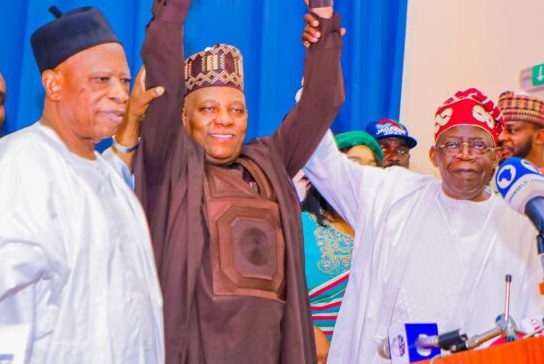Under the election petition filed by the Labour Party, as one of the grounds of the petition, Mr Obi, as petitioner, argued that the President-elect, Mr Tinubu’s running mate, the vice-president-elect, Alhaji Kashim Shetima, was not qualified at the time he was nominated to run as the vice presidential candidate of the APC. Concerning the alleged non-qualification of Mr Tinubu’s running mate, Mr Shettima, the petitioner cited his nomination for two separate constituencies – as Borno Central senatorial candidate and vice-presidential candidate for the whole of Nigeria in the same election cycle.
As part of his petition, Mr Obi said the law provided that a presidential candidate shall nominate another person as his associate who is to occupy the office of vice president. He stated that Mr Tinubu had nominated Mr Shettima as his vice-presidential candidate on 14 July 2022 while the latter was still representing Borno Central Senatorial District at the National Assembly. In his petition, Mr Obi
said Mr Shettima should not have been nominated in “more than one constituency” as it was a violation of the provision of the Electoral Act.
The petition tried to rationalize that the sponsorship of Tinubu and Shettima while the latter was still representing Borno Central Senatorial district, rendered their candidacy invalid. Thus, for this reason, the votes recorded for Mr Tinubu at the presidential election were/are wasted votes and ought to be disregarded”.
Advertisement
This specific ground of the petition calls for an understanding of the nomination of a vice presidential candidate under Nigerian law.
A Presidential candidate duly nominated by a political party in Nigeria has a constitutional duty to nominate another associate from the same political party for his running for the office of the President as a condition precedent to the validity of the nomination of the presidential candidate.
Section 142(1) of the Constitution of the Federal Republic of Nigeria, 1999 (as amended) provides:
Advertisement
“In any election to which the foregoing provisions of this part of this Chapter relate, a candidate for an election to the office of President shall not be deemed to be validly nominated unless he nominates another candidate as his associate from the same political party for his running for the office of President, who is to occupy the office of Vice-President and that candidate shall be deemed to have been duly elected to the office of Vice-President if the candidate for an election to the office of President who nominated him as a such associate is duly elected as President in accordance with the provisions aforesaid.”
Section 142(2) of the said Constitution provides thus:
“The provisions of this part of this Chapter relating to the qualification of election, tenure or office, disqualification, declaration, of assets and liabilities and oath of President shall apply in relation to the office of Vice-President as if references to President were references to Vice-President.”
By the provision of Sub-section 2 of Section 142 of the Constitution, it is the provisions of Chapter VI of the Constitution relating to the Federal Executive that recourse will be had to on issues relating to qualification or otherwise of Vice-Presidential candidate as in the case of a presidential candidate. It is necessary to go through the provisions of Chapter VI of the Constitution to identify the disqualification factors that will inhibit a candidate’s chance of the occupation of the plum offices of the President and Vice-President.
Advertisement
Section 137(1) and (2) of the 1999 Constitution (as amended) provides as follows:
“(1) A person shall not be qualified for election to the office of President if –
(a) Subject to the provisions of section 28 of this Constitution, he has voluntarily acquired the citizenship of a country other than Nigeria or, except in such cases as may be prescribed by the National Assembly he has made a declaration of allegiance to such other country; or
(b) He has been elected to such office at any two previous elections; or
Advertisement
(c) Under the law in any part of Nigeria, he is adjudged to be a lunatic or otherwise declared to be of unsound mind; or
(d) He is under a sentence of death imposed by any competent court of law or tribunal in Nigeria or a sentence of imprisonment or fine for any offence involving dishonesty or fraud (by whatever name called) or for any other offence, imposed on him by a court or tribunal or substituted by a competent authority for any other sentence imposed on him by such a court or tribunal; or
Advertisement
(e) Within a period of less than ten years before the date of the election to the office of President he has been convicted and sentenced for an offence involving dishonesty or he has been found guilty of the contravention of the Code of Conduct; or
(f) He is an undischarged bankrupt, having been adjudged or otherwise declared bankrupt under any law in force in Nigeria or any other country; or
Advertisement
(g) Being a person employed in the civil or public service of the Federation or of any State, he has not resigned, withdrawn or retired from the employment at least thirty days before the date of the election; or
(h) He is a member of any secret society;
Advertisement
(i) Deleted
(j) He has presented a forged certificate to the Independent National Electoral Commission.
(2) Where in respect of any person who has been –
(a) Adjudged to be a lunatic;
(b) Declared to be of unsound mind;
(c) Sentenced to death or imprisonment; or
(d) Adjudged or declared bankrupt,
Any appeal against the decision is pending in any court of law in accordance with any law in force in Nigeria, subsection (1) of this section shall not apply during a period beginning from the date when such appeal is lodged and ending on the date when the appeal is finally determined or, as the case may be, the appeal lapses or is abandoned, whichever is earlier.”
Section 138 of the Constitution provides:
“The President shall not, during his tenure of office, hold any other executive officer or paid employment in any capacity whatsoever.”
From the above, a Vice-Presidential candidate can be disqualified if he is affected by any of the factors itemized under Section 137(1) and (2) of the Constitution. The heated political debate accentuated by the recent general elections in Nigeria has brought to the fore, issues relating to how and when a Vice-Presidential candidate should be nominated and not many are considering this from the perspective of the law but subjecting it to individual understanding.
There are also divergent views as to whether the nomination of a Vice-Presidential candidate is a pre-election matter or a ground to void the election before the Presidential Election Petition Tribunal (the Court of Appeal). In the case of the PEOPLES DEMOCRATIC PARTY v. ALL PROGRESSIVES CONGRESS & ORS FHC/ABJ/CS/1734/2023 the issue of the propriety or otherwise of the nomination of the Vice-Presidential candidate by the Presidential candidate, Asiwaju Ahmed Bola Tinubu, on the platform of the APC was submitted for judicial determination. PDP submitted that Mr. Kashim Shettima knowingly allowed himself to be nominated in two Constituencies ie. Borno Central Senatorial District and the Vice-President of Nigeria contrary to the provisions of Section 35 of the Electoral Act, 2022.
The Federal High Court, Abuja Division presided over by Hon. Justice Inyang Ekwo dismissed the suit on the premise that the suit was filed as a pre-election matter and PDP not being a participant in APC Presidential Primary Election lacked the locus standi to maintain the suit. Section 29(5) of the Electoral Act, 2022 was called in aid of the decision of the court.
PDP was dissatisfied with the decision of the Federal High Court and lodged an appeal to the Court of Appeal, Abuja Division in Appeal No: CA/ABJ/108/2023. The Court of Appeal reviewed the entire case and upheld the decision of the Federal High Court. The concurrent decision of the Court of Appeal is the present position of our courts in respect of the nomination of a Vice-Presidential candidate.
One important area that requires scrutiny is Section 29(5) of the Electoral Act, 2022. The disqualification under the section relates to the constitutional requirements to contest elections. Section 35 of the Electoral Act, 2022 upon which the case was predicated is not a constitutional requirement to contest the Presidential election.
May we take a close look at Sections 29(5) and (6) and 35 of the Electoral Act, 2022 to better appreciate the point being made?
“29(5) Any aspirant who participated in the primaries of his political party who has reasonable grounds to believe that any information given by his political party’s candidate in the affidavit or any document submitted by that candidate in relation to his constitutional requirement to contest the election is false, may file a suit at the Federal High Court, against the candidate seeking a declaration that the information contained in the affidavit is false.”
“29(6) Where the Court determines that any of the information contained in the affidavit is false only as it relates to constitutional requirements of eligibility, the Court shall issue an order disqualifying the candidate and the sponsoring political party and then declare the candidate with the second highest number of valid votes and who satisfies the constitutional requirement as the winner of the election.”
“35 Where a candidate knowingly allows himself to be nominated by more than one political party or in more than one constituency, his nomination shall be void.”
Section 29(5) relates to constitutional requirements only and Section 29(6) of the Act emphasized that the false information furnished by a candidate should relate only to constitutional requirements of eligibility for the court to issue an order disqualifying the candidate and the sponsoring political party. It is clear as crystal that the nomination of a candidate by more than one political party or a candidate knowingly allowing himself to be nominated in more than one Constituency is a statutory provision and not a Constitutional requirement for eligibility to contest the election. To my own mind, the law is clear and we must not import anything into the cumulative provisions of Section 142(1) & (2) of the 1999 Constitution (as amended) and Section 29(5) & (6) of the Electoral Act, 2022 which is not contained therein.
It is also my considered opinion that the nomination contemplated by Section 35 of the Electoral Act, 2022 is nomination under Section 84 of the Electoral Act, 2022. For instance, the All Progressives Congress adopted the indirect procedure of Presidential primary election and Section 84(5)(i) & (ii) provides:
“(5) A political party that adopts the system of indirect primaries for the choice of its candidate shall adopt the procedure outlined –
(a) In the case of nominations to the position of Presidential candidate, the –
“(i) Political party shall hold a special presidential convention at a designated centre in the Federal Capital Territory or any other place within the Federation that is agreed to by the National Executive Committee of the party where delegates shall vote for aspirants of their choice.
(ii) Aspirant with the highest number of votes cast at the end of voting shall be declared the winner of the presidential primaries of the political party and that aspirant’s name shall be forwarded to the Commission as the candidate of the party.”
There is nowhere in Section 84 of the Electoral Act, 2022 where nomination into the office of the Vice-President is provided for and it will be taken out of context to state that the Vice-President allowed himself to be nominated for more than one constituency under the Electoral Act. The nomination of a Vice-Presidential candidate in Nigeria is in its genre and does not come under the statutory provision of the Electoral Act. In 1999 Alhaji Atiku Abubakar was not only nominated by the Peoples Democratic Party as its Governorship candidate in Adamawa State but was the Governor-elect when he was nominated by Chief Olusegun Obasanjo as his Vice-Presidential candidate for the 1999 Presidential election under the 1999 Constitution and the duo won and held offices for eight years.
I make bold to say that Section 35 of the Electoral Act, 2022 is not a Constitutional requirement that can affect the nomination of a Vice-Presidential candidate and by extension the qualification of a Presidential candidate as one validly nominated or not. The Constitution does not contemplate that and we must not import what is not provided for into the province of the relevant legislation.
Thus, one would submit that on that particular ground of the election petition filed by the Labour Party and Mr Obi, where they argue that the President-elect, Mr Tinubu’s running mate, the vice-president-elect, Alhaji Kashim Shetima, was not qualified at the time he was nominated to run as the vice presidential candidate of the APC thus rendering the votes they got as wasted, the petitioners have fully and completely wrongly stated the position of the law.







